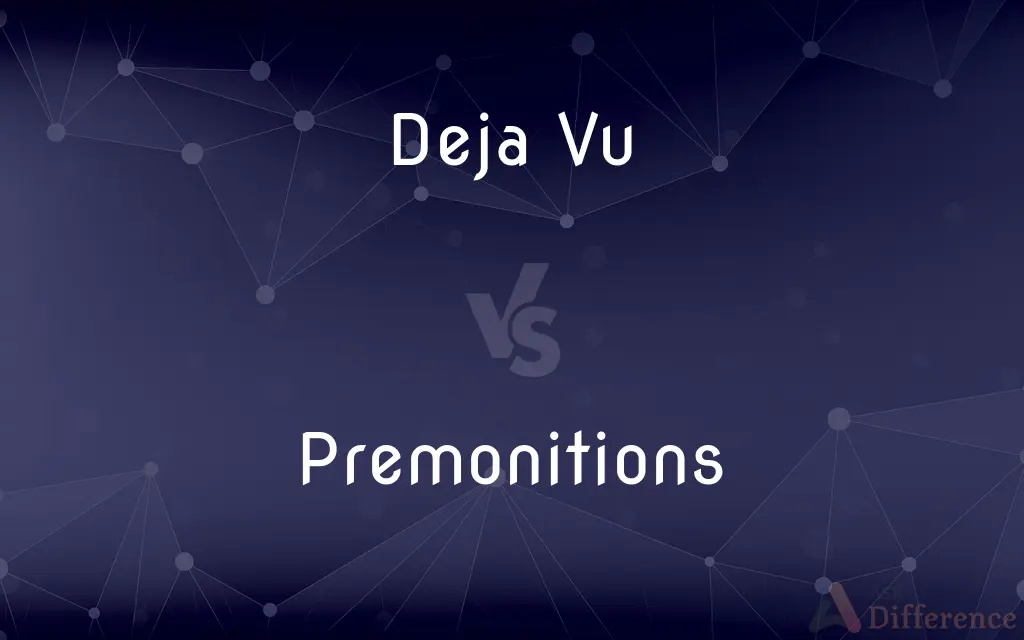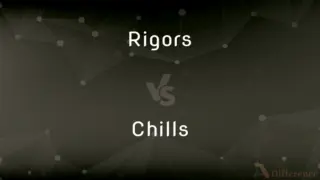Deja Vu vs. Premonitions — What's the Difference?
Edited by Tayyaba Rehman — By Fiza Rafique — Published on November 28, 2023
Deja Vu is the feeling of having already experienced a current situation, while Premonitions are intuitive feelings about future events.

Difference Between Deja Vu and Premonitions
Table of Contents
ADVERTISEMENT
Key Differences
Deja Vu and Premonitions are both intriguing phenomena related to human experience and cognition, yet they differ in nature and timing. Deja Vu is that uncanny sensation that one has been in a particular situation before, even when encountering it for the first time. It's as if the present moment has somehow occurred in the past. Contrarily, Premonitions involve a sense of foreknowledge about future events, often without any logical explanation.
Many people experience Deja Vu at some point in their lives. It's a fleeting and often disorienting sensation that feels almost like a memory glitch. Despite its mysterious nature, some researchers believe Deja Vu might be related to processes in the brain that deal with memory and recognition. On the other hand, Premonitions are less commonly reported and are more closely associated with intuition or a "gut feeling" about something that might happen in the future.
It's essential to understand that while Deja Vu is related to past sensations and memory, it pertains to events currently unfolding. People feel as if they're reliving a moment. Premonitions, however, are all about the anticipation of future events. While some might dismiss them as mere coincidences or the result of subconscious observations, others believe they hold deeper, sometimes spiritual, significance.
Scientifically, Deja Vu has been studied more extensively than Premonitions. Various theories, ranging from misfiring neurons to parallel universes, attempt to explain its cause. Premonitions, given their predictive nature, are harder to study empirically and are often steeped in folklore, spirituality, and personal anecdotes.
In summary, while both Deja Vu and Premonitions touch on the boundaries of human cognition and experience, they stand apart in their orientation to time: Deja Vu relates to a familiar feeling in the present, and Premonitions concern anticipations of the future.
ADVERTISEMENT
Comparison Chart
Definition
Sensation of having experienced a current situation before.
Intuitive feelings or visions about future events.
Orientation to Time
Pertains to the present.
Pertains to the future.
Scientific Study
More extensively researched.
Less empirically studied.
Associated with
Memory and recognition.
Intuition and foresight.
Nature
Cognitive phenomenon.
Often viewed as intuitive or spiritual.
Compare with Definitions
Deja Vu
A cognitive anomaly linked to memory processes.
Experiencing Deja Vu, she wondered if her brain was playing tricks on her.
Premonitions
Intuitive insight or foreknowledge.
Her Premonitions often came in dreams, vivid and telling.
Deja Vu
A feeling that one has lived through the present situation before.
When she entered the room, she was hit with an intense sense of Deja Vu.
Premonitions
Forebodings or presentiments.
Before the storm, many in the village had ominous Premonitions.
Deja Vu
A phenomenon where present moments feel like past experiences.
The conversation gave him Deja Vu, as if they'd discussed it before.
Premonitions
A feeling of anticipation or anxiety over future events.
He had a Premonition that the trip wouldn't go as planned.
Deja Vu
Often described as reliving a moment.
Walking down the unfamiliar street, she felt a strong Deja Vu.
Premonitions
Often considered a type of extrasensory perception.
Dismissing logic, he trusted his Premonitions to guide his decisions.
Deja Vu
A fleeting sensation of familiarity.
He felt Deja Vu when hearing the song, even though it was new to him.
Premonitions
A warning or indication of a future event.
She felt a chilling Premonition when the phone rang late at night.
Premonitions
A presentiment of the future; a foreboding
I had a premonition that our risky endeavor would end badly.
Premonitions
A warning in advance; a forewarning
That skirmish was a premonition of battles to come.
Premonitions
Plural of premonition
Common Curiosities
Can Premonitions be scientifically explained?
Premonitions aren't fully understood scientifically, though some believe they arise from subconscious observations.
How long does a Deja Vu experience last?
Deja Vu is typically brief, lasting only a few seconds.
Are Premonitions considered supernatural?
While some view Premonitions as spiritual or psychic phenomena, others see them as heightened intuition.
Why do people experience Deja Vu?
The exact cause isn't known, but theories suggest it might relate to memory processes in the brain.
Are Premonitions always accurate?
Not necessarily. While some people believe strongly in their Premonitions, they can also be coincidental.
Can Deja Vu be triggered intentionally?
Typically, Deja Vu occurs spontaneously, though some factors might increase its likelihood.
Is there a difference between Premonitions and intuition?
While both involve foreseeing events, Premonitions are often more specific, and intuition is a broader sense of understanding.
Do all people experience Deja Vu?
Most people experience Deja Vu at some point, but not everyone.
Is Deja Vu a sign of a medical condition?
While Deja Vu is common and often harmless, frequent occurrences can sometimes indicate neurological issues.
Can dreams be considered Premonitions?
Some people believe certain dreams can be Premonitions, though this is subjective and varies among individuals.
Share Your Discovery

Previous Comparison
Rigors vs. Chills
Next Comparison
Travelers vs. TouristsAuthor Spotlight
Written by
Fiza RafiqueFiza Rafique is a skilled content writer at AskDifference.com, where she meticulously refines and enhances written pieces. Drawing from her vast editorial expertise, Fiza ensures clarity, accuracy, and precision in every article. Passionate about language, she continually seeks to elevate the quality of content for readers worldwide.
Edited by
Tayyaba RehmanTayyaba Rehman is a distinguished writer, currently serving as a primary contributor to askdifference.com. As a researcher in semantics and etymology, Tayyaba's passion for the complexity of languages and their distinctions has found a perfect home on the platform. Tayyaba delves into the intricacies of language, distinguishing between commonly confused words and phrases, thereby providing clarity for readers worldwide.












































